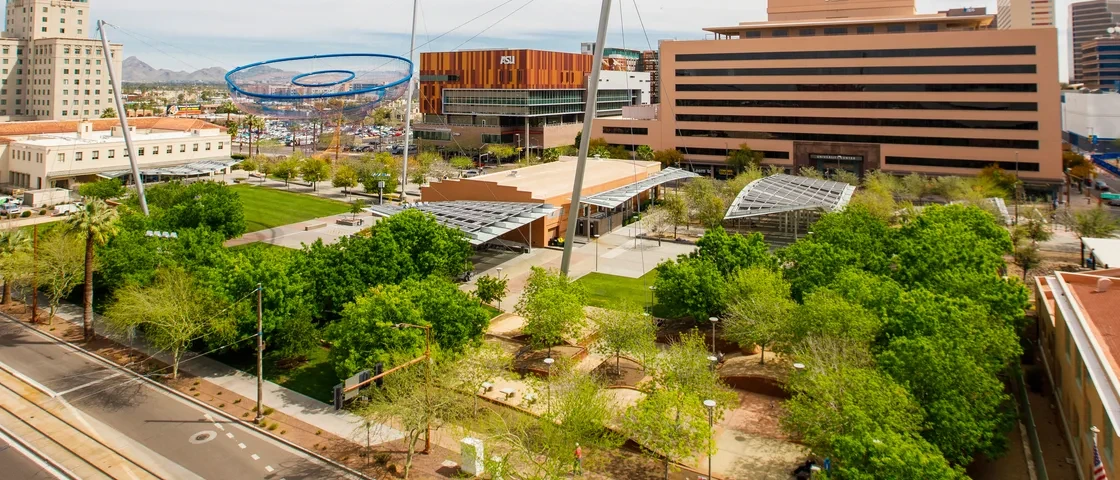

Arizona State University (Downtown Phoenix campus)
Recreation Therapy, BS
Study detals
: Bachelor's degree : Recreation Therapy, BS PPRECTBS : Full time : 48 MonthRequirements
Academic requirements
First-year students must:
- Have a 3.00 grade point average (GPA) (a "B" or better where "A"=4.00) from a secondary school. Some ASU programs may have higher admission or English proficiency requirements and may consider a minimum ACT or SAT score.
- Must have three years of high school coursework. (If you are currently in high school, ASU needs to see 9–11 grade coursework. If you have completed high school, ASU needs to see 10–12 grade coursework.)
- Must have and present a completed high school diploma or certificate.
Conditional admission
ASU may offer conditional undergraduate admission to international applicants to an on-campus program who meet the academic (aptitude) requirements but who are not proficient in English. This offer of conditional admission will give you time to improve your English proficiency before you start classes at ASU. Your conditional admission offer is good for up to three semesters, during which time you must meet one of these requirements to begin your ASU experience.
Competency requirements
International students who completed high school outside the U.S. are required to meet the following competency requirements:
- Math: four years (algebra I, geometry, algebra II and one course requiring algebra II as a prerequisite).
- Laboratory science: three years total (one year each from any of the following areas are accepted: biology, chemistry, earth science, integrated sciences and physics).
Provide evidence of English language proficiency (TOEFL 61)
Additional information
Program description
The BS program in recreational therapy prepares students to apply for the national professional certification through the National Council for Therapeutic Recreation Certification: https://nctrc.org/about-certification/ctrs-the-qualified-provider.
The program prepares competent, entry-level recreational therapists with the requisite knowledge, skills and abilities needed to improve functional outcomes and increase participation in life activities for individuals experiencing health conditions. It is designed for students who want to learn to conduct assessments, develop service plans, implement therapeutic interventions, and evaluate and document outcomes of care. They gain skills to effectively provide comprehensive therapeutic recreation services that include program design and evaluation, individual and group service provision, and advocacy. The required fieldwork component of the program facilitates the development of competencies to provide quality recreational therapy services.
Students who choose this degree program are committed to improving people's lives and contributing to their communities. This degree program is one of two such programs in Arizona, both offered by the School of Community Resources and Development. This program has a heavier emphasis on health care settings such as hospitals and human service agencies, while the Bachelor of Science in parks and recreation with a concentration in therapeutic recreation prepares students to provide recreational therapy services in community settings such as youth programs, adaptive sports, or parks and recreation.
This major is eligible for the Western Undergraduate Exchange program at the following location: Downtown Phoenix campus. Students from Western states who select this major and campus may be eligible for reduced nonresident tuition at a rate of 150% of Arizona resident tuition plus all applicable fees.
Concurrent program options
Students pursuing concurrent degrees (also known as a “double major”) earn two distinct degrees and receive two diplomas. Working with their academic advisors, students can create their own concurrent degree combination. Some combinations are not possible due to high levels of overlap in curriculum.
Accelerated program options
This program allows students to obtain both a bachelor's and master's degree in as little as five years. It is offered as an accelerated bachelor's plus master's degree with:
- Community Resources and Development (Nonprofits and NGOs), MS
- Community Resources and Development (Parks and Recreation Management), MS
- Community Resources and Development (Sustainable Communities), MS
- Community Resources and Development (Tourism), MS
- Community Resources and Development, MS
Acceptance to the graduate program requires a separate application. Students typically receive approval to pursue the accelerated master’s during the junior year of their bachelor's degree program.
Program learning outcomes identify what a student will learn or be able to do upon completion of their program. This program has the following program outcomes:
- Illustrate collaborative solutions to complex community health issues (e.g., access to healthcare and recreation, health disparity, mental health, obesity, physical activity, substance abuse).
- Employ effective communication skills including adapting use of nonverbal messaging when communicating with diverse audiences
- Demonstrate elements of a qualified provider facilitating recreational therapy services.
Global opportunities
Global experience
With more than 300 Global Education program opportunities available, recreation therapy students are able to tailor their experience to their individual interests and skill sets. Whether in a foreign country, in the U.S., or online, students build communication skills, learn to adapt and persevere, and are exposed to research and internships across the world, increasing their professional network.
Career opportunities
Recreational therapy is a rapidly growing field, given the rising number of returning veterans and an aging population. Graduates are prepared for work in a wide variety of clinical settings, including hospitals, rehabilitation centers and extended care facilities. Graduates also are qualified to work in community settings such as parks and recreation departments.